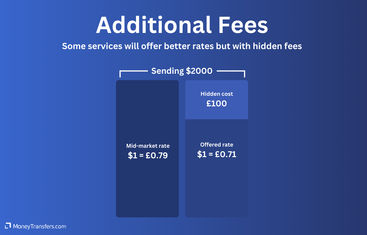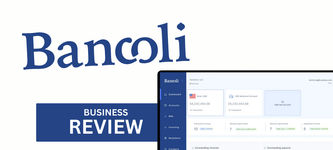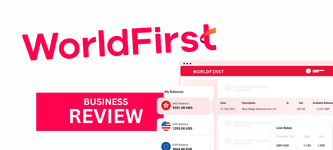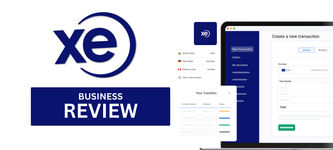International Business Money Transfers
Find the best business money transfer provider for what your business needs. Compare local accounts, mass payments, get the best exchange rate possible, and avoid hidden fees.
We have compiled the very best the business transfer industry has to offer.
Compare Business Transfers
Business Provider Reviews
Compare business providers
Each provider offers different things, here's how they stack up against each other.


.png)
Business account alternatives
If you're looking to switch services for your business, or still researching, we've prepared a list of alternatives that will help you make informed decision and help you find the best company for your business needs.
Risk management


Choosing a business provider
International business transfer can be time-consuming and at times daunting. High fees, poor exchange rates, and lengthy processing times can eat into profits and disrupt cash flow.
Traditional banks often give a raw deal on exchange rates and fees. There is also little support for extras like expense management or batch payments.
Business-focused money transfer services offer competitive rates, lower fees, and faster transaction times.
Choosing a business transfer provider over a bank offers:
Better exchange rates
Low or no fees
A mix of online and managed service
Currency risk strategy
Local accounts in multiple countries
Business money transfer providers compared
Choosing the best business provider depends on your specific needs, but generally these fall into two categories:
Online-Only Providers: Favorable for smaller businesses looking to self-manage quick transfers. Examples include Wise and Airwallex.
Managed Services: Offer personalized assistance and higher transaction limits. Examples include MoneyCorp, IFX Payments and Regency FX.
Here's a comparison of these options:
Feature | Online-Only Providers | Managed Services |
|---|---|---|
Transfer Fees | Often $0 (can sometimes be a percentage on top of a transfer) | $0 |
Transfer Speed | 1-3 days | 1-5 days |
Customer Support | Limited to help portals or chats | Account managers Often 24/7 phone support Custom risk strategy |
Our business money transfer data
We are one of the only products online comparing business money transfers specifically.
Our business search results include over 20 business providers, more options than many others on the market.
To compile the best options for business transfers we look at everything a business offers. This ensures we provide you with the ability to make the most informed choice.
In all articles on the site, we cover fees, exchange rates, user reviews, online feedback, and supported currencies. With business transfer options this also includes local currency accounts, currency risk management, expense management, and marketplace and accounting software integration. Each business is different and we try to cover all angles so sole traders up to enterprises are aware if a specific product is correct for them.
With this, we have tested these products hands-on, spoken to customer service teams and sent international transfers to test live speed rates.
Every business and every transfer is different and I’d always recommend searching for the amount you want to send, and where you want to send it to. This will give you a live price on how best to send your money.
Money transfer companies and your business
Many of the leading money transfer providers currently operating in the remittance space offer tailored international B2B transfer services which are safer, faster, and cheaper than the cost of a traditional bank transfer.
Leading money transfer companies such as TorFX, Wise, and Key Currency specialize in helping businesses move money around the world, offering plenty of flexible options such as spot and forward contracts, market orders, business funding, and multilingual customer support.
Due to the nature of their business, money transfer companies commit 100% of their time and effort to securing the most desirable foreign currency exchange deals for their customers. In contrast, banks primarily focus on other financial services such as loans, credit, and online spending.
There are countless providers to choose from, but to make it easier for our customers, we have reviewed the biggest and best in the industry.
Insights to business money transfer companies
There are many money transfer services to choose from and to save you time, we have narrowed down the list to the top 3. We have spent time researching each option based on what businesses need from a competitive money transfer service. Choosing any of these is a good deal, but read the brief overviews below to help you find a service that matches your needs.
TorFX is arguably the best money transfer service for businesses because they offer no transfer fees. Instead, they charge a 1-3% markup on currency conversions, and TorFX supports 60 currencies - perfect for international businesses.
Also, TorFX provides flexible transfer options for businesses, including mass payments and spot contracts. This allows international companies to wait until they get a preferred currency conversion rate before transferring funds. Customer support is another positive of TorFX since they go above and beyond when offering help.
XE is a top-tier money transfer service perfect for international businesses that want to save money on exchange rates. They have extensive global coverage of over 170 countries and accept almost any currency you can think of. This is perfect for businesses with customers worldwide and requires access to markets that most money transfer services neglect.
XE facilitates the transfer of all sizes, which is ideal for businesses that want to process small and large transactions alike. They have a fair fee structure and do not charge a significant markup percentage. This allows businesses to send money internationally without expensive fees that would have to be paid at banks.
Airwallex started as a cheap method of allowing businesses to send money internationally. It also acts as a multicurrency payment gateway that will enable customers to be accepted worldwide. Therefore, Airwallex allows companies to grow without borders.
How to find the best money transfer for business?
Now let us turn our attention to the process of choosing a top-tier money transfer company for businesses. This section includes the factors that should be considered when looking for an excellent service to help with international business transfers.
Deposits/withdrawals: ideally, there should be multiple deposit and withdrawal methods from the money transfer service. This offers the flexibility to use the method that matches your business needs. Also, backup options are handy for ensuring the business can continue without setbacks when the primary method fails.
Invoicing: automated and easy-to-use invoicing tools are required for businesses. Money transfer companies should provide these tools to help businesses invoice customers to get paid.
Tax: business tax is a complicated problem, and money transfer companies must offer a way to summarize relevant transactions. This allows the correct transactions to be grouped so that tax information can be prepared.
Currency options: businesses want to offer customers a way to pay in their local currencies. Therefore, the more currencies supported by the money transfer platform, the better. In addition, it means businesses can enter new markets and provide customers with a way of paying that they are familiar with.
Regulated: top-tier money transfer companies will be regulated by regulatory bodies like the Financial Conduct Authority. This indicates that trusted 3rd parties have vetted them.
Exchange rate: poor currency conversion rates can wipe out a profit margin. Therefore, businesses want a money transfer service that can match the mid-market rate. There is no markup when converting currencies, ensuring businesses get the best rate for current market conditions. XE is an example of a business-friendly money transfer company that provides outstanding value.
What are the hidden costs of an international business transfer?
Businesses need to find an international money transfer method that keeps the costs low, or it will eat into the profits. The most important factors to note when choosing a business transfer method are fees and the exchange rate.

Fees and exchange rate: the cost should match the amount sent. For instance, when sending large amounts of money, a low fixed fee is the best format. Competitive money transfer services provide a mix of fixed and percentage-based fees that match the amount you send. Also, bad exchange rates can act as another type of fee. Therefore, it is ideal to find a service that matches the mid-market rate or charges a low mark-up percentage.
Speed: speed can also be another factor that contributes to cost. Generally, slower transfer methods are cheaper than faster ones. This is true for bank transfers, where a premium is charged to decrease transfer speeds. However, top-tier money transfer companies offer instant transfers without charging extra. For example, Wise offers free and fast money transfers.
Taxes: in most countries, commercial money transfers are subject to taxes. The amount of taxes that must be paid varies in each country. Therefore, businesses need to find out the relevant laws in the world's regions where they are doing business. Hiring a business tax lawyer is the best way to ensure appropriate payments are made.
Money transfer services vs. banks: overall, business transfers with specialist transfer companies are cheaper than using banks. For instance, bank wire transfers cost $20-$50 per transfer. This fee takes a big chunk of smaller transfers. In comparison, money transfer companies have more competitive fee structures. As a result, they can offer lower fees because of lower overheads.
Best ways to receive business payments
Business need to accept international payments in different ways.
Bank transfers: many small businesses choose ACH (Automated Clearing House) processing to receive money. This is a relatively low-cost method of receiving funds from many countries worldwide. However, the funds can take 1-3 business days to process. Therefore, businesses would ideally get funds faster to alleviate cash flow problems.
Credit and debit cards: most online consumers love to use cards as the payment method. This means businesses must offer VISA and MasterCard as payment methods to ensure that they can accommodate many customers. However, the fee can be between 1-3% of the transaction amount, which is costly. The speed of receiving credit card payments is instant, which helps with business cash flow issues.
Payment gateways: businesses can use payment gateways to provide customers with additional checkout options. Some top payment gateways include Stripe, Skrill, 2Checkout, Amazon Pay, and PayPal. There are different types of payment gateways. Some act as a means of accepting credit card payments, while others allow money to be received within the service account, which can then be withdrawn using methods like a bank transfer.
Receiving business payments

More focused on receiving international business payments? We've compiled everything to know on large and regular incoming business transfers. This includes from invoices and business marketplaces.

Should you use international business transfers?
Businesses have many ways of sending and receiving money. The top ones include bank transfers, payment gateway, credit cards, and money transfer services. Each has its pros and cons, so businesses should choose one that matches their needs.
We found that money transfer companies like TorFX and Xe are the best services for international business transfers. They offer business-friendly features, fast transfer times, match the mid-market rate for many currency conversions, and flexible fee structures.
We encourage you to continue learning about international business transfers by checking out our other guides.
Help & FAQ
Get answers to the most common questions asked when sending money abroad. Covers costs, fees and the best way to compare.
Sources & further reading
Related Content
Contributors














.png)
.svg)




.svg)













